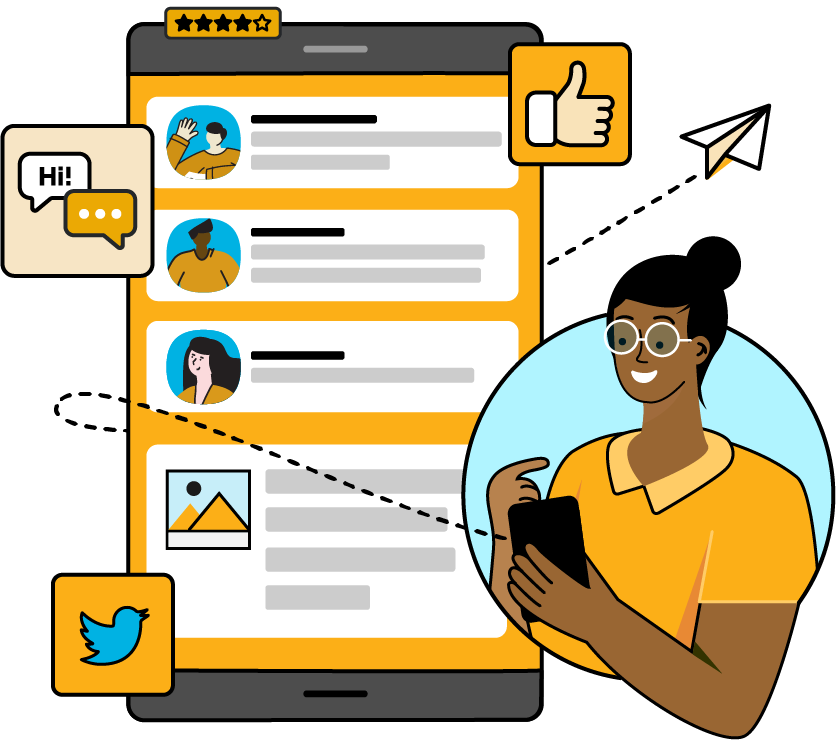Personal social media use
Overview
An employee's personal social media accounts may include well-known channels such as Facebook, X, LinkedIn and Instagram. It also extends to any site where an employee may be posting content. This can include anything from pictures of family members and vacations on photo sharing sites, to comments on a news article, a review on a public website, comment on a video or a hobby blog unrelated to work.
An employee's personal social media account does not require their manager's approval to create, post or share as the content is managed and populated by you.

Guidelines for a personal social media account
If you have a personal social media account, you should:
not reveal confidential/private or personal information gained through work
not use visuals (images, logos, etc.) that suggest the account represents the Government of Ontario
avoid actions which could compromise or appear to compromise the integrity of the public service
ensure your use is consistent with your obligations as a public servant, including your Oath of Office and conflict of interest and political activity rules
If in doubt, don’t post it.
Best practices for appropriate use
Appropriate social media use is based on specific circumstances. Here are some examples that may help guide the use of a personal account.
Sharing job-related/ministry content
Appropriate use
Examples of use that may be appropriate include:
- posting a link to an official announcement on the launch day of a project or program
- sharing a job posting from a ministry department
- reposting stakeholder or third-party content or information on a personal channel
Inappropriate use
Examples of use that may be inappropriate, because they go against a policy or principle, include:
- posting details about an upcoming government campaign that has not been released to the public
- interacting with (for example, posting, sharing or tagging) the premier, a minister or an official ministry account in a slanderous way or in a way that violates your duties and obligations as a public servant
- making false or inaccurate statements about a government policy
Talking about the workplace
Appropriate use
Examples of use that may be appropriate include:
- sharing a group photo of your team attending a public event with permission
- tagging colleagues on an article you think they'd find interesting
- attending a conference and using the conference hashtag in a post that highlights interesting learnings
Inappropriate use
Examples of use that maybe inappropriate, because they go against a policy or principle, include:
- sharing a photo from a brainstorming session that includes images of documents that could be enlarged to view personal or confidential information
- writing a personal blog or social media post criticizing a stakeholder involved in a workplace project that you are directly associated with
- posting a status that makes light of inappropriate workplace behaviour
Sharing, tagging and liking
When sharing and publishing content on your personal social media account/channels, consider your Oath of Office and your responsibilities as a public servant, including conflict of interest and political activity rules.
Risk
There is no requirement to talk about the work you do; however, many public servants are proud of the projects they have helped develop and may have an interest in sharing, to their personal social media account, their achievements, job title and place of work.
You may share work-related content that is considered public/non-confidential, but it is important that you do not violate your duties as a public servant.
There is always a risk (for example, reputational damage to a person or employer) if you are sharing, posting, liking or interacting over social media.
Using a disclaimer like, “opinions are my own,” can help clarify that the account does not speak on behalf of the government, but it will not remove your obligations and responsibilities.
You may face employment-related consequences if your personal social media account is inconsistent with applicable employment legislation, principles or policies. These consequences may include discipline — up to and including dismissal.
Participating in political activity
Depending on your role in the Ontario Public Service, your ability to participate in political activities offline and online are governed by the political activity provisions of the PSOA.
Please refer to the Political Activity Rights and Restrictions to better understand how to balance the non-partisanship of the public service with an individual's ability to engage in political activity.
Collecting personal information, privacy and permissions
In regard to work-related activities, it's important that you do not collect, post or share private or personal information about others without proper permissions and approvals. It is also advisable that you obtain the consent of any individual before you post their image.
For photos or videos of individuals, proper permissions and approvals could include:
- verbal approval (understanding that this approval could be revoked at any time)
- posting a notice of collection at a work-related event
If you are unsure about what permissions are required or whether something is deemed private/personal, please speak to your manager or refer to the Freedom of Information and Protection of Privacy Act.
Example scenarios
The following scenarios demonstrate how to apply the social media guidelines. However, the list of potential risks and considerations are not exhaustive. If in doubt, don't post, or check with your manager or communications branch on how to proceed.
Scenario 1
An employee is excited to participate in an OPS charity event. They set up a meeting with their co-workers to promote the great work the charity is doing and ask for donations. The employee takes a few pictures of the event to share on their social media channels.

Potential risks and things to consider:
- Did everyone in the picture give permission?
- Would this be considered political activity and not appropriate to share?
- Are there personal or confidential items in the background?
- Does this reflect poorly on the government in any way?
- Could this be a conflict of interest or perceived to be a conflict of interest?
- Would this be considered offensive?
- Could this result in disciplinary action up to and including dismissal?
Recommendation
Before posting, the employee should consider the risks.
If their post does not pose a risk or display confidential information, and they have the proper consent, they may be fine to share on their personal social media accounts. Staff members who wish to post content of their work environment should consult with their manager before posting content.
Read more about the legislation, principles and policies for social media use.
Scenario 2
An employee and their co-workers dislike one of the staff members who works in their office. They feel like their co-worker is lazy and not a hard worker. The employee decides to write a blog about it and includes how they and others feel towards the person.

Potential risks and things to consider:
- Are there personal or confidential items about the work or person being shared in the blog?
- Does this reflect poorly on the government in any way?
- Is this a conflict of interest?
- Would this be considered offensive?
- Would this be considered workplace harassment and bullying?
- Could this result in disciplinary action up to and including dismissal?
Recommendation
Before posting, the employee should consider all the risks. The employee should not post this blog. The content of the blog would be considered offensive, would reflect poorly on the government and/or government employee and would be considered online bullying. If posted, they may face disciplinary action — up to and including dismissal.
Read more about the legislation, principles and policies for social media use.
Scenario 3
An employee runs a small business on the side. They respond to customer emails while at work and they use their work computer to visit their business website, view their business reviews and send out social media announcements about their business.

Potential risks and things to consider:
- Is this a conflict of interest or perceived to be a conflict of interest?
- Would this be considered a misuse of I&IT resources?
- Does this reflect poorly on the government in any way?
- Could this result in disciplinary action up to and including dismissal?
Recommendation
Before working on their business, the employee should consider the risks. Based on the Acceptable Use of I&IT Resources Policy and Conflict of Interest rules, they should not use their work resources for their own personal business. This could also be viewed as a misuse of government time and resources as a salaried employee. This could result in discipline — up to and including dismissal.
Read more about the legislation, principles and policies for social media use.